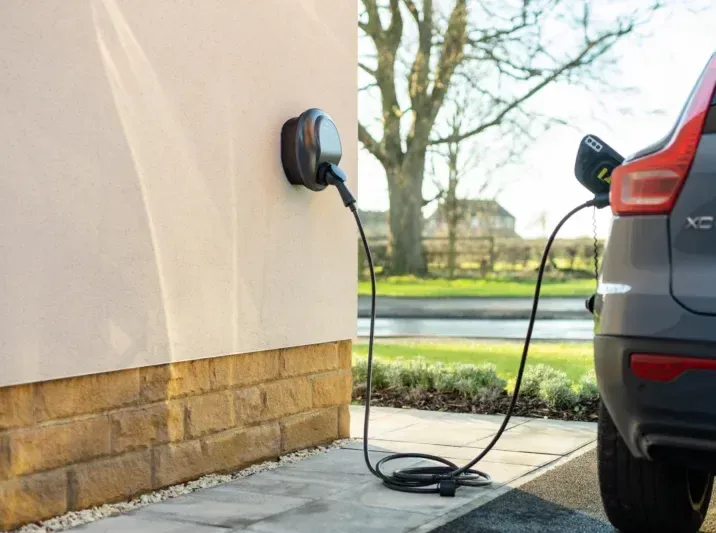On this page
As the adoption of electric vehicles (EVs) continues to grow, so does the need for flexible and convenient charging options. Portable EV chargers have emerged as an essential tool for EV owners, offering an effective solution for on-the-go charging needs. This article delves into what portable EV chargers are, how they work, and the key factors to consider before making a purchase.

The connector that plugs into a standard electrical socket.
A device with an LCD display for real-time charging information and controls for adjusting current settings based on specific needs.
A durable, weather-resistant cable, usually around 16 feet in length, that connects the control box to the EV.
These chargers are comparable to portable power banks for smartphones and other gadgets. Just as a power bank provides enough charge to keep your device running until you find a proper outlet, a portable EV charger delivers enough energy to get your vehicle to the nearest charging station. However, unlike stationary chargers, portable chargers are not intended for fully recharging an EV battery but rather for providing a temporary energy boost.
These chargers are comparable to portable power banks for smartphones and other gadgets. Just as a power bank provides enough charge to keep your device running until you find a proper outlet, a portable EV charger delivers enough energy to get your vehicle to the nearest charging station. However, unlike stationary chargers, portable chargers are not intended for fully recharging an EV battery but rather for providing a temporary energy boost.
Using a portable EV charger is simple and intuitive:
1. Plug the charger into a standard wall outlet.
2. Connect the other end to your EV's charging port.
3. Adjust the current settings on the control box, if necessary, to ensure safe and efficient charging.
The control box displays critical charging information such as power output, current level, and charging duration, giving users full control over the process.
1. Plug the charger into a standard wall outlet.
2. Connect the other end to your EV's charging port.
3. Adjust the current settings on the control box, if necessary, to ensure safe and efficient charging.
The control box displays critical charging information such as power output, current level, and charging duration, giving users full control over the process.
Portable EV chargers offer several benefits:
With a portable charger, you can charge your EV anywhere there’s a compatible power source, making it an excellent backup option during trips.
These chargers are compatible with a wide range of EVs, provided they meet the necessary power and plug requirements.
Portable chargers are user-friendly, with clear instructions and adjustable settings to suit various charging scenarios.
Emergency Charging: Ideal for situations where you may not have immediate access to a public charging station, they can provide enough energy to reach the nearest facility.
Emergency Charging: Ideal for situations where you may not have immediate access to a public charging station, they can provide enough energy to reach the nearest facility.
To ensure you choose the right portable EV charger for your needs, consider the following factors:
Portable EV chargers are available in a range of prices, depending on their features, power output, and build quality. While budget-friendly options exist, investing in a reliable and durable charger is crucial to ensure safety and performance.
Not all EV chargers are universally compatible. Ensure that the charger you select supports your vehicle’s charging port and power requirements. Compatibility with various wall outlets is also essential, especially if you plan to use the charger in different regions.
Portable chargers typically operate on standard 120V or 240V outlets. Confirm that the charger’s power specifications align with the electrical infrastructure you have access to.
Charging speed is a critical factor. While portable chargers are generally slower than fixed charging stations, higher-wattage models can deliver a faster energy boost. Check the output specifications to meet your time-sensitive needs.
A good portable charger should be lightweight and compact enough to store in your car. Consider models with carrying cases or protective covers for added convenience during travel.
Safety should never be compromised. Look for chargers with built-in safety mechanisms such as overcurrent protection, overheating prevention, and water resistance. Certifications from reputable organizations can also provide peace of mind.
While portable EV chargers are highly convenient, they do come with limitations:
Portable chargers generally have lower power outputs than fixed charging stations, making them less effective for long-range charging.
These chargers are designed for temporary use and are not a substitute for regular charging at home or at public stations.
Charging is only possible if a compatible power source is nearby, which may not always be the case in remote areas.
As EV adoption accelerates, the demand for portable charging solutions is expected to grow. Innovations such as higher-capacity chargers, faster charging speeds, and improved compatibility are likely to enhance the utility of portable EV chargers. Manufacturers are also exploring solar-powered portable chargers, which could offer an environmentally friendly alternative for off-grid charging.
Portable EV chargers are an invaluable accessory for EV owners, providing flexibility, convenience, and peace of mind during travel. While they may not replace fixed charging solutions, their ability to deliver a temporary energy boost makes them a must-have for those who frequently drive long distances or venture into areas with limited charging infrastructure. By considering factors like compatibility, charging speed, and safety, you can find the perfect portable charger to suit your needs and ensure a smoother EV experience.
Would you like to learn more about the latest portable charger models or their technical specifications?
Would you like to learn more about the latest portable charger models or their technical specifications?